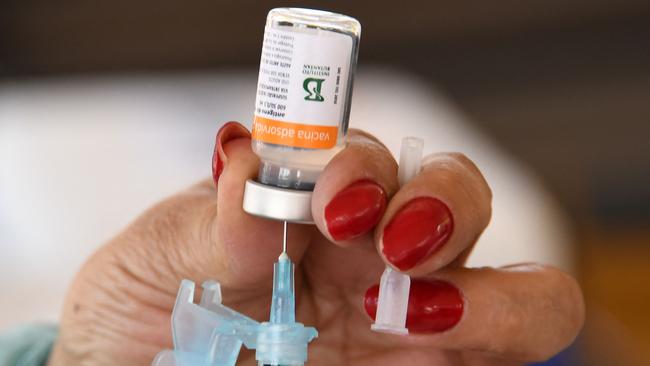When will Covid end?: Medical experts answer Aussies’ important questions
Aussies are still being struck down by Covid. Medical experts reveal when the virus will end and answer all the big questions about the deadly virus.
Coronavirus
Don't miss out on the headlines from Coronavirus. Followed categories will be added to My News.
Covid-19 is still a major health issue for Australians and with new strains continually populating, medical experts have weighed in on the important questions you want answers to.
WHEN WILL COVID END?
The short answer is Covid-19 is unlikely to go away anytime soon.
Telethon Kids Institute infectious diseases expert Professor Christopher Blyth said Covid-19, as with other seasonal Coronaviruses, would continue to circulate within the community.
“It is likely that the SARS-CoV2 virus will continue to circulate and new strains are likely to emerge. As with seasonal coronaviruses, it is expected infection with SARS-CoV2 will become increasingly hard to distinguish from other respiratory viral infections and that severe disease will predominantly be seen in those with risk factors for severe disease including age, underlying medical conditions such as heart and lung disease and cancer,” Prof Blyth, who is also the director of the Wesfarmers Centre for Vaccines and Infectious Diseases and a pediatrician at Perth Children’s Hospital, said.

WHAT ARE THE DOMINANT COVID STRAINS AND HOW DO THEY DIFFER?
Omicron variants are the more dominant strains at present, said Prof Blyth.
“Since November 2021, the Omicron variant has circulated globally, slowly evolving. The most common strains include EG.5 (the Eris variant), XBB.1.16, XBB.1.5, CH.1.1, XBB.1.9.1 and 2, XBB.2.3 and B.1.1.529. The trend is for new Omicron variants to be more transmissible than the predecessors but we are seeing little data to demonstrate that the illness they cause is any more severe,” he said.
“Although they are distinct, it is encouraging that the emerging variants aren’t that genetically different so, our immunity, our vaccines and approach to testing and treatment do not need to be adjusted.”
WHAT IS THE DIFFERENCE WITH THE FLU?
While influenza and Covid-19 are both respiratory viruses they come from “distinct families”, Prof Blyth said.
“This is important because the treatments and vaccines we use for Covid-19 and influenza are distinct – influenza vaccines and influenza antivirals do not impact on Covid-19 and vice versa,” he said.
However, they are similar in that they are both RNA viruses, he said.
“RNA viruses are those that are susceptible to constant evolution – ongoing mistakes in replicating copies of themselves means that they continue to evolve and therefore pose risks of new pandemics,” Prof Blyth said.
COVID, FLU RAT TESTS
Australians are likely well acquainted with the Covid RAT tests that were distributed widely at the height of the pandemic but combination flu and Covid-19 RATs have recently become available.
A Pharmacy Guild of Australia (PGA) spokesperson said: “Covid-19 and influenza combination rapid antigen tests are self-test kits which can detect both Covid-19 and influenza A and influenza B”.
“Many of the symptoms of Covid-19 and influenza overlap, and these combination rats can be useful in helping patients determine whether they are suffering from Covid-19 and/or influenza,” they said.
“This allows the patient to seek out the appropriate treatment, which may differ depending on the patient’s age and health.”
Prof Blyth said while not as accurate as traditional PCR tests, these combo RATs were more convenient, especially for those at an increased risk of severe flu or Covid.
He encouraged Australians to shop around and look out for tests that have been registered for use in Australia.
WHAT COVID VACCINES ARE AVAILABLE IN AUSTRALIA?
The following vaccines have been approved by the Therapeutic Goods Administration (TGA) for use in Australia: Pfizer (Cominaty) Original, Omicron BA.1 and Omicron B.4/5; Moderna (Spikevax) Omicron BA.4-5; Novavax (Nuvaxovid), a Health Department spokesperson said.
The spokesperson said the TGA was evaluating two vaccine applications, one from Moderna and the other from Pfizer, that target the Omicron XBB.1.5 strain, which has seen a spike in the US in recent weeks and led to return of some mask mandates.

“As with all Covid-19 vaccines to date, all Covid-19 applications will be treated with the highest priority, however the TGA will only be in a position to make a registration decision once all the required data has been provided and assessed,” the TGA stated.
It comes after US President Joe Biden indicated the XBB.1.5-targeted vaccine could be recommended for all US residents to get.
Mr Biden said on Friday he signed off on a proposal to Congress seeking additional funding for a new vaccine “that works”.
“And tentatively — not decided finally yet — tentatively, it is recommended that … it will likely be recommended that everybody get it no matter whether they’ve gotten it before or not,” he said on Friday.
HOW OFTEN SHOULD PEOPLE GET COVID VACCINES?
Prof Blyth said vaccines for Covid-19 were still available, and that it was recommended that everyone over five years receive tow primary doses of a Covid vaccine.
“Three years into the pandemic, vaccination remains as important as ever for those who have never been diagnosed with Covid-19 – we have clear evidence that vaccination reduces the risk of severe disease,” he said.
Prof Blyth recommended Australians speak with their GP about their individual Covid vaccine needs but said a booster was recommended in 2023 for all adults with underlying conditions and everyone over the age of 65 who was more than six months post their last Covid-19 infection.
It was also recommended that those with underlying conditions aged 5-17 years and healthy adults consider a booster if they were more than six months after their last Covid-19 infection.
“Regarding vaccine choice, all currently available COVID-19 vaccines are anticipated to provide benefit as a booster dose, however bivalent mRNA booster vaccines are preferred over other vaccines for most Australian,” he said.
WHAT ABOUT FLU SHOTS?
The PGA spokesperson said the period of peak influenza circulation was typically between June to September each year, and encouraged Australians to get their influenza vaccine prior to the beginning of the season.

Despite it being the middle of the season, “patients who are not already vaccinated can receive an influenza vaccine while stock is still available and in date.
“For most patients there is no recommendation to receive a second influenza vaccine in the one season.
“Two doses of influenza vaccine are only recommended for patients aged between six months to nine years or, if receiving they are receiving the influenza vaccine for the first time; and for people who have had certain transplant operations.”
Prof Blyth said flu shots were recommended for everyone over the age of six months to protect them, even if they had the flu this year already.
“It is strongly recommended and funded under the national program for older Australians aged over 65 years, young children aged six months to less than five years, those with underlying medical conditions, all Aboriginal and Torres Strait Islander people and pregnant women,” he said.
“State funded programs have also made flu vaccine readily available for other populations. Only one dose of a flu vaccine is recommended unless you are at risk and travelling to the Northern Hemisphere into their 2023-2024 influenza season.”
WHAT SHOULD IMMUNOCOMPROMISED PEOPLE DO?
“If you are immunocompromised, you should be reviewing your immunisation needs regularly. This will mean an annual influenza vaccine and in 2023 a Covid-19 booster if more than six months after your most recent infection,” Prof Blyth said.
“It is too early to determine whether a 2024 Covid-19 booster will be required for immunocompromised individuals but recommendations are expected to be published ahead of winter 2024.”
WHERE CAN AUSSIES GET A COVID, FLU VACCINE?
“A pharmacist or GP can provide advice and/or administer the right vaccine for the patient’s age,” a Pharmacy Guild of Australia (PGA) spokesperson said.
“The Find-a-Pharmacy website can be used to identify pharmacies which are providing vaccination services for Covid-19 and influenza and can be used to book an appointment. Some pharmacies may also offer walk-in appointments.”
WHAT OTHER THINGS CAN PEOPLE DO TO PROTECT THEMSELVES?
Prof Blyth encouraged Aussies to use simple measures that were heavily adopted during the height of the pandemic, such as mask wearing and hand hygiene, to help prevent them from getting Covid and the flu.
“Particularly if you are at risk of severe disease or going into situations where your risk of exposure increases, masks remain an effective option. Staying away from work, school or social events if you are unwell protects those around you and good cough etiquette and hand hygiene are simple ways to protect you and those around you,” he said.





